Carah Ronan, a fifth-generation Montana farmer, never envisioned herself returning to the farm. Growing up in a conventional agricultural setting, surrounded by sugar beets, corn, cattle, and canola, she pursued higher education after high school. Then life took a turn when she and her husband, Zach, decided to move back to Montana in 2021 to support her grandmother after the loss of her father and maternal grandfather.
Carah's journey home was driven by practicality. "Putting my hands in the dirt, getting to work, and making some money," she says. Her goal was to ensure her grandmother could stay on the land in the home she enjoys, surrounded by her loyal dog Dori, and some chatty ducks.
Three years later, Rodi Farms is flourishing, thanks in part to the support of the USDA Natural Resources Conservation Service (NRCS). The tools and resources provided by NRCS have been key to making her unique operation a growing success.
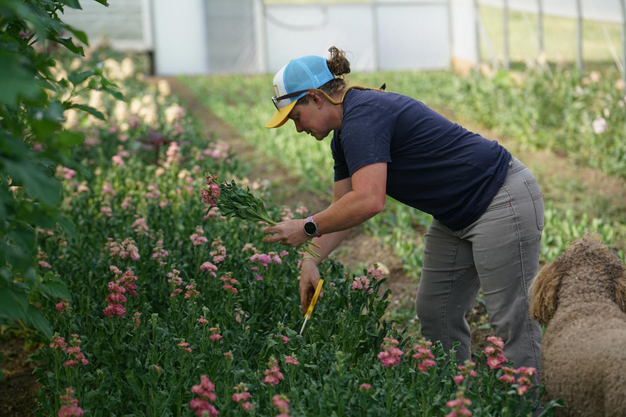
Located on eight acres, Rodi Farms operates on a smaller scale than traditional farms. Ronan explains, "Flowers leave a smaller footprint, so they can grow a lot of volume in a short growing season on that smaller footprint." Currently, they are growing on about one acre, with space to expand.
The property, which served as the home base for her grandparents' larger 600-acre operation was initially in good condition due to their previous organic practices. like manure fertilization. Ronan, now the sole owner and operator, receives help from her husband, Zach, who assists on his off days and after work. "I couldn't do everything I do without his help and support," she acknowledges.
Ronan starts most of her plants from seed trays, except for Lisianthus. They harvest flowers early in the morning and late in the evening when the sugar content is highest to capture the best blooms. Their timing also works well for pollinators who are most active at midday and in the afternoon.
"The ultimate goal is to be profitable for this to make sense," says Ronan. She is hoping to add employees next year, especially after completing the production facility.
Partnering with NRCS
Ronan has always been aware of USDA programs through her family's farming background. Initially, the family erected a high tunnel on their own. In her second season, she partnered with NRCS, which led to the installation of a second high tunnel in 2022. This has been a game-changer for the farm.
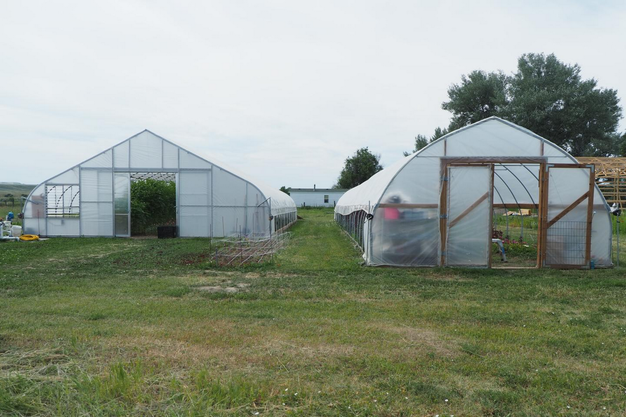
"We would make more of our own, but it is so much nicer and quicker not to have to bend every piece of pipe on our own," Ronan says. "My 90-year-old grandma was down bending pipes for the first greenhouse, and her heart doctor called to make sure she wasn't overdoing it. When I asked if it was okay for her to keep bending pipe, the doctor said, 'If she's bending pipes at 90, let her keep doing it!'"
NRCS has provided invaluable guidance and support, helping with plant spacing, windbreak support, micro-irrigation setup, and best practices. Ronan describes it as an extension of community outreach. NRCS District Conservationist Evan VanOrder is impressed with how Rodi Farms maximizes production on their small acreage. "Carah has worked with local NRCS on the high tunnel program through the Environmental Quality Incentives Program (EQIP) as well as micro-irrigation and pump and pipeline to supply the micro-irrigation system for her growing operation. Her windbreak is also through EQIP."
The collaboration with NRCS has been vital. "There are so many ways to run an operation and so many different variables," Ronan says. "Having NRCS as a resource to bounce ideas off of is invaluable." She likens working with NRCS to having a tool in her toolbelt, providing essential support when needed.
NRCS practices in practice
NRCS works with producers of all sizes to protect resources and ensure sustainability. VanOrder emphasizes the importance of Ronan's operation in building community resilience. "Carah's operation is a very intensive system, farming on about an acre of ground in production. It bolsters the local economy, benefiting her family and the community."
NRCS has funded a micro-irrigation system and assisted with setting up operations to distribute water from Ronan's pond and pump house throughout the farm. The smart watering system schedules irrigation, ensuring different sections receive proper water at the right times.
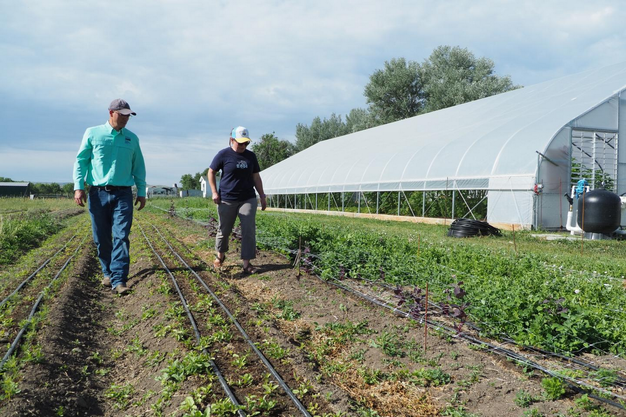
Ronan's well is less than 14 feet deep, providing irrigation water from a very shallow water table. After heavy rains, the water often rises due to flooding from the two nearby rivers leaving the back end of her property wet and marshy. To address this, she planted a line of willows at the far end. "That's part of the windbreak plan—trying to hone in on what's going to work best for your land," Ronan explains.
NRCS assisted with planting trees along the side of her lot, including juniper, chokecherry, and some willow. The willow will help to remediate the marshy land, while also protecting against strong winds.
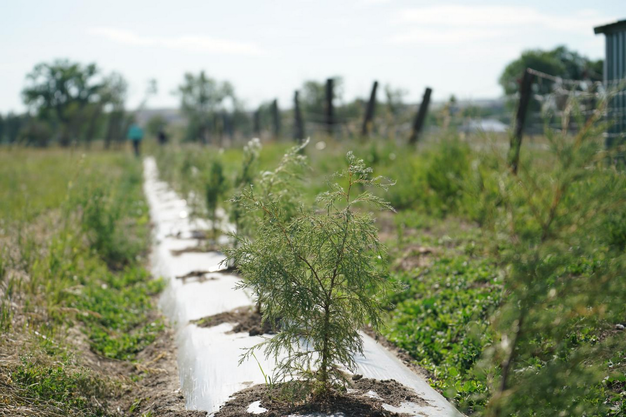
"Wind can break structures, so mitigating those risks with the windbreaks she's planted has been considered in her high tunnel builds," VanOrder says.
Ronan's high tunnels have extended her growing season by several months, while also providing protection from Montana's harsh weather conditions. Ronan has installed automated controls in her high tunnels, including auto-roll-up sides, vents, and fans, which help manage temperatures and simplify operations. "We can set what we want this hoop house to be, and it takes care of itself," she says.
Ronan particularly values working with NRCS staff, who bring practical knowledge and a deep understanding of agricultural needs. "It becomes a really great collaboration," she says. "You can talk about what's working on your place and figure out different solutions or trade ideas back and forth."
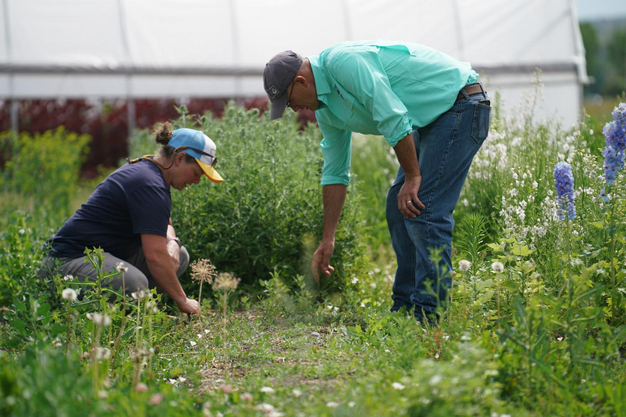
Flowers for sale
Rodi Farms primarily sells flowers wholesale to local grocery stores like Town and Country Foods and Whole Foods in Bozeman, where they are the only contract growers. They also supply flowers to local florists. With all that, they've seen significant growth, with a 30 percent increase in deliveries this year.
Ronan acknowledges the challenges of the local market. She hasn't raised her prices in three years despite inflation and shortages.
"If people would just start supporting their local agriculture and local farmers, we'd be a lot more sustainable," she says. While there is a growing awareness of local food, the market is still developing.
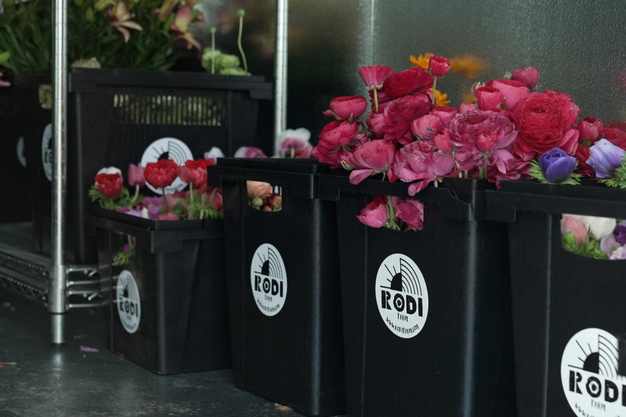
Looking ahead
Ronan is passionate about maintaining agricultural practices that support local communities. She believes in being self-sustaining. The fertile land of the Yellowstone Valley, situated between two river corridors, provides a strong foundation for her farming endeavors.
"Carah's real conscious about her operation and making sure she's doing it sustainably," VanOrder says. "She's been progressive in trying to expand her operation in a way to maximize her yield potential for the product that she's growing and making sure the soil is being built and healthy."
Ronan's journey back to her family farm has been marked by hard work, determination, and strategic support from the NRCS. Her grandmother, spry and full of wisdom, helps out when the weather permits. "She doesn't always come out into the heat of the greenhouses, but she'll always come out and check what's happening, what's planted and what's growing," Ronan says. They've planted some things closer to the house so Grandma can harvest and participate.
"Pretty much everyone in our family knows how much hard work goes into it so everyone's proud of what we're doing, but they're simultaneously like 'You guys are gonna work yourselves to death.' I was joking with my grandma, 'but you were doing the same thing when you were 40 and she was like 'yeah I guess I did.' It's just that reminder of it's just what you do," Ronan reflects.
As she looks to the future, Ronan knows new challenges will come up. "Next year we'll have different challenges. You just pivot for that and you're always mitigating and getting what you can," she says. "It's all you can do." Her grandmother, a wealth of wisdom and experience, often reminds her of the hard work required to sustain the farm, a sentiment both women deeply understand.
"I come by it honestly," Ronan says, looking toward her grandmother. "It takes a certain type, huh Gram?" With all the wisdom of someone who has seen generations of farming and the realization that nothing happens without a lot of hard work, Grandma replies, "Oh yeah."
